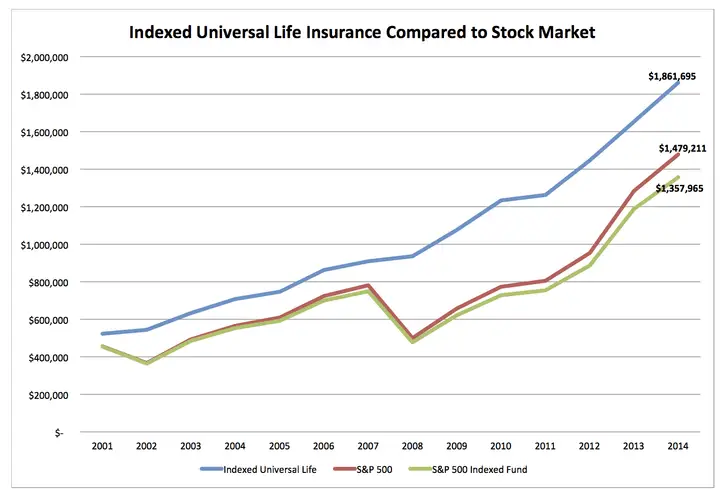All Categories
Featured
Table of Contents
Do they contrast the IUL to something like the Vanguard Overall Stock Market Fund Admiral Shares with no lots, an expenditure proportion (ER) of 5 basis points, a turnover ratio of 4.3%, and an extraordinary tax-efficient record of circulations? No, they contrast it to some horrible actively handled fund with an 8% load, a 2% EMERGENCY ROOM, an 80% turnover proportion, and a terrible document of temporary funding gain distributions.
Common funds often make yearly taxed circulations to fund proprietors, even when the worth of their fund has gone down in value. Mutual funds not just need revenue coverage (and the resulting yearly taxation) when the shared fund is increasing in value, yet can likewise enforce income taxes in a year when the fund has gone down in worth.
That's not how common funds function. You can tax-manage the fund, gathering losses and gains in order to reduce taxed distributions to the capitalists, yet that isn't in some way going to transform the reported return of the fund. Only Bernie Madoff kinds can do that. IULs prevent myriad tax obligation traps. The ownership of common funds may need the common fund proprietor to pay projected taxes.

IULs are very easy to place so that, at the owner's fatality, the beneficiary is not subject to either revenue or estate tax obligations. The exact same tax obligation decrease strategies do not work virtually too with shared funds. There are various, frequently costly, tax catches related to the timed trading of shared fund shares, traps that do not use to indexed life insurance policy.
Chances aren't extremely high that you're going to be subject to the AMT because of your mutual fund circulations if you aren't without them. The rest of this one is half-truths at finest. While it is true that there is no earnings tax due to your heirs when they inherit the profits of your IUL plan, it is also true that there is no income tax obligation due to your beneficiaries when they acquire a shared fund in a taxable account from you.
Max Funded Indexed Universal Life Insurance
There are much better means to avoid estate tax concerns than acquiring financial investments with low returns. Shared funds might create revenue tax of Social Safety and security benefits.

The development within the IUL is tax-deferred and may be taken as tax totally free revenue via car loans. The policy owner (vs. the mutual fund manager) is in control of his/her reportable income, hence enabling them to lower or perhaps remove the tax of their Social Safety and security advantages. This is wonderful.
Right here's one more very little problem. It holds true if you purchase a common fund for claim $10 per share right before the circulation date, and it disperses a $0.50 distribution, you are after that going to owe tax obligations (most likely 7-10 cents per share) although that you haven't yet had any gains.
In the end, it's really regarding the after-tax return, not how much you pay in taxes. You're additionally possibly going to have even more money after paying those tax obligations. The record-keeping requirements for owning shared funds are substantially more complicated.
With an IUL, one's documents are maintained by the insurance provider, duplicates of annual declarations are mailed to the proprietor, and circulations (if any kind of) are completed and reported at year end. This is likewise type of silly. Naturally you ought to keep your tax documents in instance of an audit.
Pros And Cons Of Indexed Universal Life Insurance
Barely a reason to acquire life insurance. Common funds are typically part of a decedent's probated estate.
Furthermore, they undergo the delays and costs of probate. The profits of the IUL policy, on the various other hand, is always a non-probate distribution that passes beyond probate straight to one's named recipients, and is for that reason exempt to one's posthumous creditors, unwanted public disclosure, or similar hold-ups and costs.
Medicaid incompetency and life time revenue. An IUL can provide their owners with a stream of earnings for their entire lifetime, no matter of just how lengthy they live.

This is advantageous when arranging one's events, and converting properties to revenue prior to a retirement home arrest. Common funds can not be transformed in a comparable way, and are nearly constantly thought about countable Medicaid properties. This is one more foolish one promoting that bad people (you know, the ones who need Medicaid, a government program for the inadequate, to pay for their assisted living home) ought to make use of IUL rather than common funds.
Why Universal Life Insurance Is Bad
And life insurance policy looks terrible when contrasted rather against a retired life account. Second, individuals that have cash to purchase IUL over and beyond their pension are going to need to be awful at handling cash in order to ever before get Medicaid to pay for their assisted living facility costs.
Persistent and terminal illness cyclist. All policies will allow an owner's very easy accessibility to cash from their plan, commonly waiving any surrender charges when such people suffer a significant health problem, need at-home care, or become confined to an assisted living facility. Mutual funds do not supply a similar waiver when contingent deferred sales costs still relate to a shared fund account whose owner needs to market some shares to money the costs of such a keep.
Iul Cost
You obtain to pay more for that advantage (cyclist) with an insurance plan. What a large amount! Indexed universal life insurance offers survivor benefit to the recipients of the IUL proprietors, and neither the proprietor neither the beneficiary can ever shed money as a result of a down market. Common funds offer no such assurances or survivor benefit of any type of kind.
Currently, ask on your own, do you really require or desire a survivor benefit? I absolutely don't require one after I get to monetary freedom. Do I desire one? I intend if it were affordable enough. Of program, it isn't affordable. Usually, a purchaser of life insurance policy spends for truth cost of the life insurance policy benefit, plus the costs of the plan, plus the revenues of the insurance policy company.
Iul Life Insurance Companies
I'm not totally sure why Mr. Morais threw in the entire "you can't lose cash" once more below as it was covered fairly well in # 1. He simply wanted to duplicate the most effective selling point for these points I expect. Again, you don't shed nominal dollars, however you can shed genuine bucks, as well as face severe chance cost due to low returns.

An indexed universal life insurance coverage plan proprietor might exchange their policy for a completely different plan without triggering earnings taxes. A common fund owner can stagnate funds from one common fund company to one more without marketing his shares at the former (thus activating a taxable occasion), and redeeming brand-new shares at the latter, frequently based on sales fees at both.
While it holds true that you can exchange one insurance plan for one more, the reason that people do this is that the very first one is such a terrible plan that even after buying a new one and going through the early, negative return years, you'll still appear ahead. If they were sold the right plan the very first time, they should not have any type of desire to ever before exchange it and go via the early, adverse return years once more.
Latest Posts
Iul Tax Free
How To Get Out Of Universal Life Insurance
Indexed Universal Life Insurance Versus Life Insurance Policy